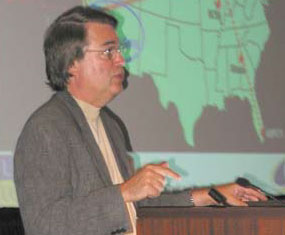Smarr Addresses Warren College Scholars
|
10.22.03 - On Tuesday this week, Calit² director Larry Smarr participated in the Warren College Scholars' Seminar, addressing a group of 50 of the top entering freshmen on the topic "The Future of Information Technology." Warren College freshmen, which number approximately 600 each year, typically have a GPA of 3.8 or higher. The group that Smarr addressed additionally has SAT scores, in both math and verbal, of 700 or higher, and the students have to submit a writing sample to qualify for admittance to the seminar series. The fall quarter of the seminar tries to achieve a balance among topics in science, social science, and the humanities. Winter quarter 2004 focuses on religions of the world.
Smarr discussed Calit², described the summer undergraduate research program that students might want to get involved in, and major technology trends, such as the spread of wireless access to the Internet, the growing number of "end points" on the Internet (information appliances such as cell phones, sensors and actuators, and embedded processors), and the coming impact of optical networking technology with its much greater capacity to support data-intensive science and collaborative analysis and visualization. He also talked about infrastructure development on campus, such as the ActiveCampus project, Sixth College's "born wireless" environment, and the Calit² CyberShuttle. And he discussed the new building that Calit² is constructing on the campus engineering quad, which should be ready for occupancy by early 2005. This building will support experiments that will influence building design in years to come.
The Warren Scholars' Seminar series covers a very broad range of topics this fall, including argumentative writing, Jews and Palestinians in dialogue, why sacrificing immigrants' rights in the war on terrorism undermines our security and liberty, issues in bioinformatics, and the novel Lord of the Rings. Other invited lecturers in the series include David Jordan, provost of Warren College; Herb York, former chancellor of UCSD; and Shankar Subramaniam, a faculty member in the Calit² Digitally Enabled Genomic Medicine layer at UCSD.


